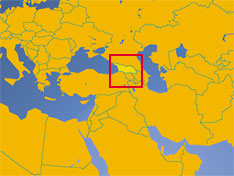It has been
almost a month since I arrived in Georgia, and two weeks since I arrived in the
village. I have been pondering this post
for a couple of days, and I still haven’t come to a conclusion as to whether or
not life in Georgia is becoming easier to navigate.
The biggest
challenge by far, especially living outside the major cities, is the language
barrier. Initially, I assumed I could effortlessly live in Georgia with my
knowledge of Russian and English; however, in my experience, this isn’t the
case. First off, there is a group of people mid to early 20s that don’t know
either English or Russian (these people would be considered potential friends
and young taxi drivers). Additionally, for those who may know English, confidence
issues and vocabulary limitations inhibit our ability to communicate. In
regards to Russian, I have no more confidence issues, if something needs to be
said I will try, but then again my vocabulary limitations hinder those
conversations. All in all, I have come to the conclusion that it is necessary
to learn Georgian. For some reason, I have really resisted, but sitting around
the house and hanging out with my family’s friends with a blank stare on my
face while everyone else is laughing or deep in thought is really quite
depressing.
The second
issue is not sharing the common knowledge that everyone (aka all the Georgians)
inherently understands. This problem is most prominent when it comes to
transportation. Fares are hardly posted, except for a few marshutkas, and the
prices change depending on the time of day. Of course, Georgians know how to
navigate the seemingly unregulated transportation system, but it isn’t until
you are shouting in English/Russian at a taxi driver about the fairness of
their prices that you realize you might be missing something that everyone else
knows. Another bit of common knowledge I seem to be missing is table etiquette.
Apparently, one should always set the table for everyone, even if you are the
only one eating. Also, I’ve noticed that all the food placed on the table isn’t
meant to be eaten- the abundance is just meant for show and being able to
resist eating all the food is a source of personal pride. Additionally, it is
seen to be rude/odd if you just sip your wine when no one is toasting (but in
my defense, the tamada takes way too long to toast especially if he is in a
drunken stupor) and god forbid if your wine glass goes empty during a supra
(which can be a fun/sad expat game to see how many times you can empty your glass
before people realize). Clearly, the only answer to this problem is to make
mistakes and ask questions.
Finally, the
physical adjustment of my body getting used to Georgian food and water has
taken a long time. Having been sick
twice already, I would just like to be able to eat and drink without
contemplating the health risks (which would be many by American standards) of
my meals. On the other hand, I must admit my experiences at the medical clinics
(in Tbilisi) have been really positive.
Clearly, adapting
just takes time and patience, but coming from a culture of instant
gratification, I would really like to finish adapting to the culture right now.




















